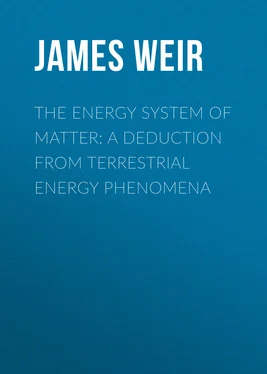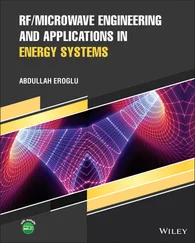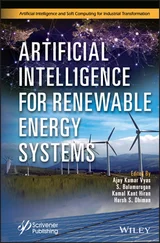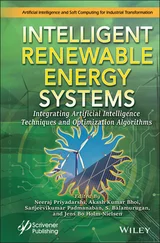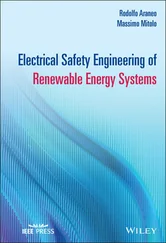James Weir - The Energy System of Matter - A Deduction from Terrestrial Energy Phenomena
Здесь есть возможность читать онлайн «James Weir - The Energy System of Matter - A Deduction from Terrestrial Energy Phenomena» — ознакомительный отрывок электронной книги совершенно бесплатно, а после прочтения отрывка купить полную версию. В некоторых случаях можно слушать аудио, скачать через торрент в формате fb2 и присутствует краткое содержание. Жанр: foreign_antique, Физика, foreign_edu, на английском языке. Описание произведения, (предисловие) а так же отзывы посетителей доступны на портале библиотеки ЛибКат.
- Название:The Energy System of Matter: A Deduction from Terrestrial Energy Phenomena
- Автор:
- Жанр:
- Год:неизвестен
- ISBN:нет данных
- Рейтинг книги:3 / 5. Голосов: 1
-
Избранное:Добавить в избранное
- Отзывы:
-
Ваша оценка:
- 60
- 1
- 2
- 3
- 4
- 5
The Energy System of Matter: A Deduction from Terrestrial Energy Phenomena: краткое содержание, описание и аннотация
Предлагаем к чтению аннотацию, описание, краткое содержание или предисловие (зависит от того, что написал сам автор книги «The Energy System of Matter: A Deduction from Terrestrial Energy Phenomena»). Если вы не нашли необходимую информацию о книге — напишите в комментариях, мы постараемся отыскать её.
The Energy System of Matter: A Deduction from Terrestrial Energy Phenomena — читать онлайн ознакомительный отрывок
Ниже представлен текст книги, разбитый по страницам. Система сохранения места последней прочитанной страницы, позволяет с удобством читать онлайн бесплатно книгу «The Energy System of Matter: A Deduction from Terrestrial Energy Phenomena», без необходимости каждый раз заново искать на чём Вы остановились. Поставьте закладку, и сможете в любой момент перейти на страницу, на которой закончили чтение.
Интервал:
Закладка:
From a general consideration of the features of this system, in which every phenomenon is an energy phenomenon, it seems feasible to conclude also that every property of matter is likewise an energy property. It is certain, indeed, that no reasonable or natural concept of either matter or energy is possible if the two be dissociated. The system also presents a direct and clear illustration of the principles of conservation in the working of the whole, and also in each planetary unit.
12. Natural Conditions
It will be noted that, up to the present point, the cosmical system has been discussed from a purely abstract point of view. This method has been adopted for a definite reason. Although able, at all points, to bring more or less direct evidence from Nature, the author has no desire that his scheme should be regarded in any way as an attempt to originate or describe a system of creation. The object has been, by general reasoning from already accepted properties of matter and energy, to arrive at a true conception of a possible natural order of phenomena. It is obvious, however, that the solar system forms the prototype of the system described above. The motion of the earth and other planets is continuously occurring under the influence of gravitation, thermal, luminous, and other incepting fields which link them to the central mass, the sun. As a result of the action of such fields, energy transformations arise which form the visible phenomena of the system in all its parts, each transformation, whether associated with animate or inanimate matter, being carried out through the medium of some arrangement of matter hereafter referred to as a material machine. The conditions are precisely as laid down above. The system is dominated, in its separate units, and as a whole, by the great principle of the conservation of energy. Each planetary mass, as it revolves in space, is, so far as its energy properties are concerned, an absolutely conservative unit of that system. At the same time, however, each planetary mass remains absolutely dependent on the primary for those great controlling or incepting influences which determine the transformation of its inherent energy.
In the special case of the earth, which will be dealt with in some detail, it is the object of this work to show that its property of complete energy conservation is amply verified by terrestrial phenomena. The extension of the principle from the earth to the whole planetary system has been made on precisely the same grounds as Newton extended the observed phenomena to his famous generalisation with respect to gravitation.
PART II
PRINCIPLES OF INCEPTION
13. Illustrative Secondary Processes
In this part of the work, an attempt will be made to place before the reader some of the purely terrestrial and other evidential phenomena on which the conclusions of the preceding General Statement are founded. The complete and absolute verification of that Statement is obviously beyond experimental device. Bound, as we are, within the confines of one planet, and unable to communicate with the others, we can have no direct experimental acquaintance with really separate bodies (§ 5) in space. But, if from purely terrestrial experience we can have no direct proofs on such matters, we have strong evidential conclusions which cannot be gainsayed. If the same kind of energy operates throughout the solar system, the experimental knowledge of its properties gained in one field of research is valuable, and may be readily utilised in another. The phenomena which are available to us for study are, of course, simply the ordinary energy processes of the earth—those operations which in the foregoing Statement have been described as secondary energy processes. Their variety is infinite, and the author has accordingly selected merely a few typical examples to illustrate the salient points of the scheme. The energy acting in these secondary processes is, in every case, derived, either directly or indirectly, from the energy of rotation or axial energy of the earth. In themselves, the processes may be either energy transformations or energy transmissions or a combination of both these operations. When the action involves the bodily movement of material mass in space, the dynamical energy thus manifested, and which may be transmitted by the movement of this material, is termed mechanical or "work" energy (§ 31); when the energy active in the process is manifested as heat, chemical, or electrical energy, we apply to it the term "molecular" energy. The significance of these terms is readily seen. The operation of mechanical or "work" energy on a mass of material may readily proceed without any permanent alteration in the internal arrangement or general structure of that mass. Mechanical or "work" energy is dissociated from any molecular action. On the other hand, the application of such forms of energy as heat or electrical energy to material leads to distinctly molecular or internal effects, in which some alteration in the constitution of the body affected may ensue. Hence the use of the terms, which of course is completely arbitrary.
The principal object of this part of the work is to illustrate clearly the general nature, the working, and the limits of secondary processes. For this purpose, the author has found it best to refer to certain more or less mechanical contrivances. The apparatus made use of is merely that utilised in everyday work for experimental or other useful purposes. It is essentially of a very simple nature; no originality is claimed for it, and no apology is offered for the apparent simplicity of the particular energy operations chosen for discussion. In fact, this feature has rather led to their selection. In scientific circles to-day, familiarity with the more common instances of energy operations is apt to engender the belief that these processes are completely understood. There is no greater fallacy. In many cases, no doubt, the superficial phenomena are well known, but in even the simplest instances the mechanism or ultimate nature of the process remains unknown. A free and somewhat loose method of applying scientific terms is frequently the cloak which hides the ignorance of the observer. No attempt will here be made to go beyond the simple phenomena. The object in view is simply to describe such phenomena, to emphasise and explain certain aspects of already well-known facts, which, up to the present, have been neglected.
In some of the operations now to be described, mechanical or "work" energy is the active agent, and material masses are thereby caused to execute various movements in the lines or field of restraining influences. For ordinary experimental convenience, the material thus moved must of necessity be matter in the solid form. The illustrative value of our experimental devices, however, will be very distinctly improved if it be borne in mind that the operations of mechanical energy are not restricted to solids only, but that the various processes of transformation and transmission here illustrated by the motions of solid bodies may, in other circumstances, be carried out in a precisely similar fashion by the movements of liquids or even of gases. The restrictions imposed in the method of illustration are simply those due to the limitations of human experimental contrivance. Natural operations exhibit apparatus of a different type. By the movements of solid materials a convenient means of illustration is provided, but it is to be emphasised that, so far as the operations of mechanical energy are concerned, the precise form or nature of the material moved, whether it be solid, liquid, or gaseous, is of no consequence. To raise one pound of lead through a given distance against the gravitative attraction of the earth requires no greater expenditure of energy than to raise one pound of hydrogen gas through the same distance. The same principle holds in all operations involving mechanical energy.
Читать дальшеИнтервал:
Закладка:
Похожие книги на «The Energy System of Matter: A Deduction from Terrestrial Energy Phenomena»
Представляем Вашему вниманию похожие книги на «The Energy System of Matter: A Deduction from Terrestrial Energy Phenomena» списком для выбора. Мы отобрали схожую по названию и смыслу литературу в надежде предоставить читателям больше вариантов отыскать новые, интересные, ещё непрочитанные произведения.
Обсуждение, отзывы о книге «The Energy System of Matter: A Deduction from Terrestrial Energy Phenomena» и просто собственные мнения читателей. Оставьте ваши комментарии, напишите, что Вы думаете о произведении, его смысле или главных героях. Укажите что конкретно понравилось, а что нет, и почему Вы так считаете.
